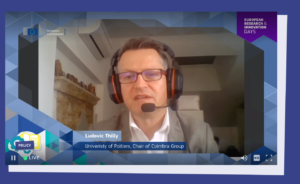Coimbra Group at the Research and Innovation Days
29 September 2020
The 2020 edition of the Research and Innovation Days took place virtually from 22 to 24 September, attracting a record number of 35 000 participants.
Launched in 2019 by the Directorate General for Research and Innovation of the European Commission, this event gathers stakeholders in the area of higher education, research and innovation from across Europe and beyond. This year’s debate focused on the Horizon Europe programme while encompassing a wide range of topical issues, including, among others, synergies between EU and other funding programmes, the future of EU relations in research and innovation with non-EU countries, brain circulation, the Green Deal and digitization. Furthermore, it provided the opportunity to hear about the policy priorities of the current and future two presidencies of the Council of the European Union (Germany, July-December 2020; Portugal, January-June 2021; Slovenia, July-December 2021), which include academic freedom, inclusion and improved employment conditions, geographical and inter-sectoral linkages.

The Coimbra Group was represented by Prof. Ludovic Thilly, Chair of the Coimbra Group Executive Board, who took part in several consultations, including the high-level virtual roundtable “Towards ERA Talent Pipeline – Strengthening researchers’ careers” chaired by Jean-Eric Paquet (Director-General – Directorate General for Research and Innovation) and marked by a renewed desire for discussion and sharing on issues related to the attractiveness of research careers, and in the open session on strengthening cross-country and cross-sectoral talents circulation (“ERA4YOU”).
The latter, moderated by Gareth O’Neill (a principal consultant on Open Science at Technopolis Group), focused on measures to balance talent circulation and increasing inter-sectoral mobility. Besides the Chair of the Coimbra Group Executive Board, speakers included Antoaneta Angelova-Krasteva (Director for Innovation, International Cooperation and Sport – Directorate General for Education, Youth, Sport and Culture), Anna Panagopoulou (Director of the Common Implementation Centre – Directorate General for Research and Innovation), Romana Jordan (Governing Board member – European Institute of Innovation and Technology) and Luisa Henriques (Coordinator for Research and Space at the Portuguese Permanent Representation to the EU).
On behalf of the Coimbra Group, Prof. Ludovic Thilly asserted that it is through significant investment in human capital that we can foster brain circulation. This is all the more the case following the disruptions brought about by the Covid-19 crisis, which have hindered the work of researchers as well as the career progressions of early-stage researchers.
A number of challenges were listed, among which the heterogeneity of the research landscape, the “silo-structure” at universities, which hampers the implementation of interdisciplinary research, and the phenomenon known as “permadoc”, which consists of researchers being recruited on short-term contracts, often for two to three years, resulting in lack of job security and a hampered career progression.
As to the possible measures to address the above-mentioned challenges, they include:
- Recognition of career pathway for researchers to ensure job security and career progression;
- Organization of research around thematic challenges as opposed to by discipline areas;
- Boosting researchers’ transversal skills, including training in the principles and practices of Open Science
- Setting up of “Welcome Centres” providing support to foreign researchers in formalities related to the employment process, country legislation, etc. In this sense, EURAXESS centres play an important role;
- Implementation of a culture of equality, diversity and inclusion across all layers of the university (appropriate employment conditions, equal opportunities, transparency of recruitment processes, representation on university committees, inclusion in career development opportunities, etc.);
- Ensuring the generalization of the human resources strategy for researchers (HRS4R) label, based on the principles of the European Charter for Researchers and the Code of Conduct.
The session ended with the following key messages from the speakers:
- Research cannot happen without researchers, therefore human capital is key in fostering talent circulation;
- When designing measures, it is important to be mindful of the differences within the European research landscape;
- Changes are needed in order to improve the quality of life of researchers.
All the sessions featuring in the programme have been recorded and are now available for viewing on the webpage of the Research and Innovation Days.


